
views
X
Research source
A hormone imbalance may be caused by a medical condition, too much stress, too little sleep, dietary choices, and other lifestyle factors. To help balance your hormones, improve your diet and use supplements. Additionally, make lifestyle changes to lower your exposure to hormones. However, check with your doctor before using natural treatments and follow up if you don’t notice any improvements.
Improving Your Diet

Consume 2-3 servings of fatty fish weekly for mood balancing omega-3s. Omega-3 fatty acids help your body properly use your hormones. Additionally, they help regulate healthy hormones. Eat a 3 oz (85 g) serving of fatty fish 3 days a week to increase your omega-3 levels. Fatty fish include salmon, tuna, sardines, mackerel, halibut, and cod.Variation: If you don’t enjoy fish, ask your doctor if it’s okay to take an omega-3 supplement. Use your supplement as directed on the label.
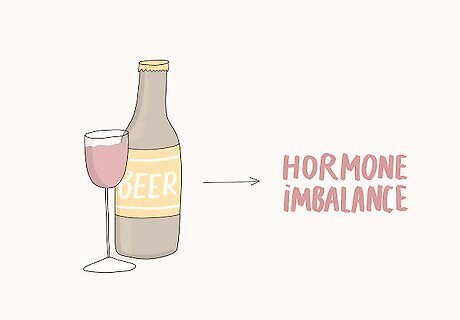
Cut back on alcohol because it deregulates your hormones. Unfortunately, alcohol disrupts your body’s ability to communicate with itself by suppressing the hormones in your endocrine system and preventing them from interacting with your brain. Alcohol can trigger a hormone imbalance, so it’s best to cut it out of your diet. If you don’t want to stop drinking completely, limit yourself to 1-2 drinks per week. Alcohol limits how your hypothalamic–pituitary–adrenal (HPA) axis responds to stress on your body and could affect your hormones.
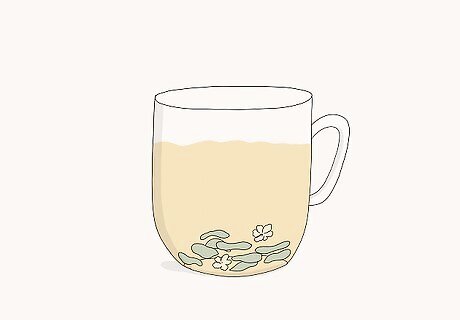
Drink green tea to improve your metabolism of hormones. Green tea helps your body process your hormones and may manage your insulin levels. This might help correct a hormone imbalance. Consume 1 cup (240 mL) of green tea daily to help your hormone levels. Just make sure you drink it in the morning, as green tea contains caffeine. For example, you might drink green tea with breakfast or as a mid-morning pick-me-up.Tip: Green tea may help you lose weight and regulate your insulin if you have polycystic ovary syndrome (PCOS).
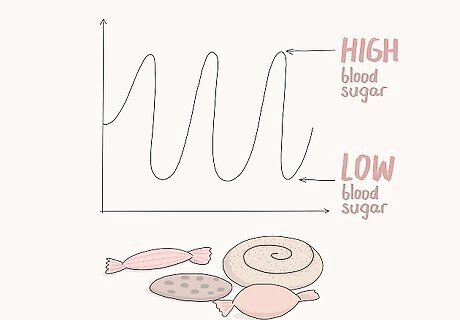
Cut added sugars out of your diet because they spike your blood sugar. When your blood sugar spikes, your body releases the hormone insulin to balance your blood sugar. However, a big spike is often followed by low blood sugar, which triggers your body to feel hungry. This can put you on a roller coaster of high and low blood sugar. To keep your blood sugar balanced, limit or eliminate added sugars from your diet. For instance, don’t eat sweets and baked goods. Additionally, avoid processed foods, which often contain added sugars. You can also improve your blood sugar and insulin by ingesting more protein, such as beans, lean meat, eggs, tofu, and nuts, and reducing the number of processed carbs you consume.
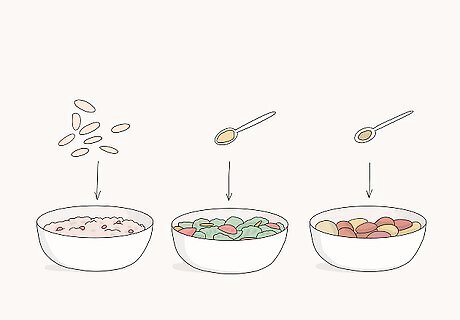
Eat healthy fats to help regulate your hormones. Healthy fats help your body manage your insulin levels and may help with insulin resistance. Additionally, healthy fats support the production of hormones that help you feel full. Incorporate healthy fats into each of your meals to help you feel full and to manage your blood sugar. For instance, sprinkle sliced almonds onto your oatmeal at breakfast, eat about 1 tablespoon (15 mL) of olive oil mixed with balsamic vinegar on your salad at lunch, and make sauteed veggies with 1 teaspoon (4.9 mL) of almond oil at dinner. Other healthy fats include avocados, fish, walnuts, flaxseed, sesame seeds, and pumpkin seeds.
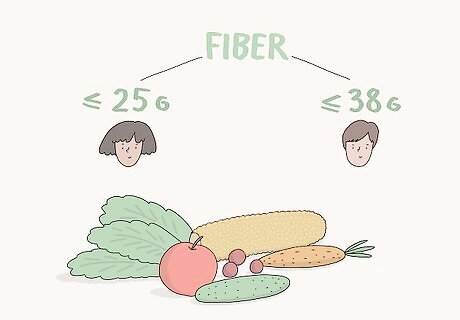
Meet your daily fiber goals to manage your insulin levels. Dietary fiber also helps control your blood sugar and may reduce the amount of insulin your body releases. This may help you rebalance your hormones if you’re dealing with insulin resistance. To meet your daily goals, eat at least 25 g of fiber daily if you’re a woman or 38 g of fiber daily if you’re a man. Good sources of fiber include vegetables, starchy vegetables with skin, beans, fruits with skin, berries, and whole grains.
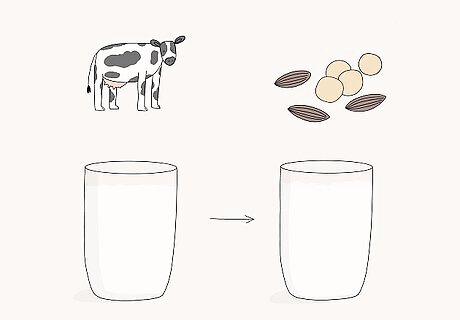
Limit dairy products if you’re worried about high estrogen. Dairy may contain hormones that can raise your estrogen levels, though it doesn’t affect everyone the same way. If high estrogen is a concern for you, consider replacing dairy products with a non-dairy alternative. This might help you avoid increasing excess estrogen in your body. For instance, choose almond or soy milk over dairy milk. Additionally, replace your dairy yogurt with a soy or coconut milk alternative. If you need to consume dairy, try to buy organic products so you don’t have any added hormones or chemicals.

Eat more cruciferous veggies if you have high estrogen. Cruciferous vegetables might help lower excess estrogen in your body. They contain sulfur and indole-3-carbinol, which help your liver process hormones and remove them from your body. Eat 1-2 .5 cup (75 g) servings of cruciferous vegetables daily. Cruciferous vegetables include cauliflower, broccoli, Brussels sprouts, cabbage, kale, and kohlrabi.
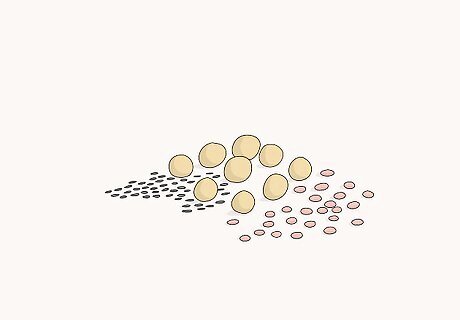
Consume legumes, chickpeas, and flax seeds to regulate estrogen. Phytoestrogens found in food might help raise your estrogen level if it’s low. Good sources of phytoestrogens include legumes, chickpeas, and flax seeds. Eat a serving of 1 of these foods daily to help raise your estrogen levels. For instance, you might eat .5 cup (100 g) of lentils or chickpeas. Alternatively, you might add 1 tablespoon (7 g) of flax seeds to a bowl of oatmeal.
Making Lifestyle Changes
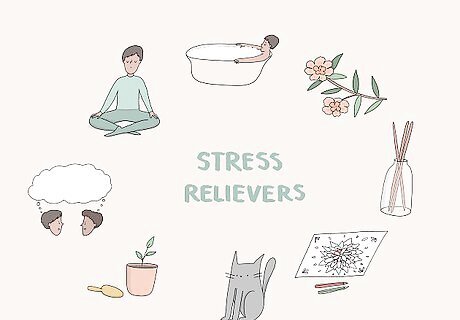
Incorporate stress relievers into your day to manage stress. Although stress is a normal part of life, excess stress can be harmful to your body. To help manage your stress, engage in daily stress relievers to help you feel more relaxed. Try different stress relievers to see what works for you. For instance, you might try the following: Mediate for 10 minutes a day. Soak in a warm bath. Go for a nature walk. Use aromatherapy. Color in an adult coloring book. Play with your pet. Engage in a hobby. Talk to your friend.
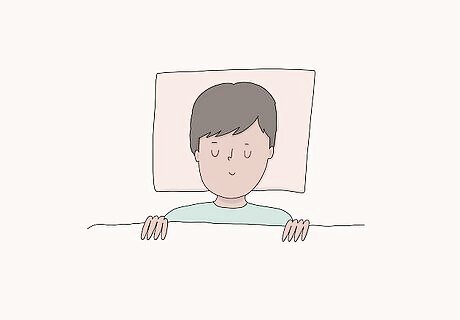
Sleep 7-9 hours a night to help regulate your hormones. Your body needs proper sleep to manage your hormone levels. If you’re tired, your endocrine system will be stressed, which might cause an imbalance. Sleep at least 7-9 hours nightly to make sure you’re well-rested. To help you fall asleep, follow a nightly bedtime routine. For instance, turn off your screens at least an hour before bed. Then, take a warm shower, change into comfortable pajamas, and read a chapter of a book.Tip: Avoid artificial light before bed because it might disrupt your body’s production of the hormone melatonin. This may make it harder for you to get proper sleep. Make sure your bedroom is completely dark while you sleep so you get the best rest.
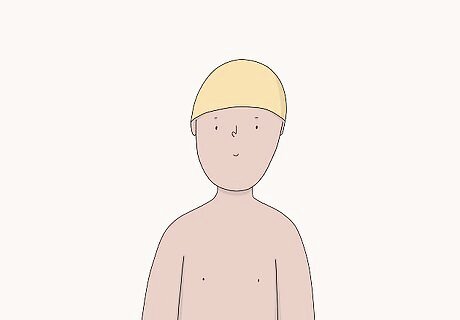
Exercise 30 minutes a day to release mood-boosting hormones. In addition to regulating your hormone levels, exercise also triggers the release of hormones called endorphins that make you feel good. Do 30 minutes of moderate-intensity exercise every day to help improve your mood and balance your hormones. For instance, try one of the following: Go for a brisk Walk. Run. Join a recreational sports team. Take a dance class. Go swimming.
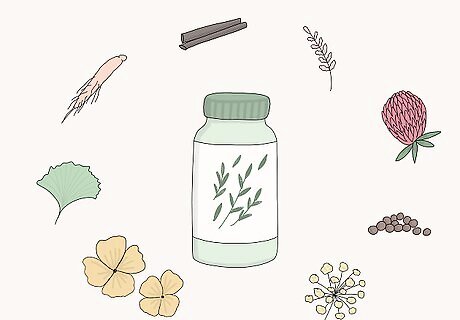
Try taking herbal supplements to balance your hormone levels. Many natural herbs have been seen to help your hormone levels get back to normal. Look for a daily supplement at your local drugstore and buy one that’s within your budget. Take the supplement daily or as directed by the package so you can start feeling the effects. It may take a few days to start noticing any changes from the supplements. Common herbal supplements include black cohosh, red clover, chaste-tree berry, dong quai, evening primrose, gingko, ginseng, and licorice.
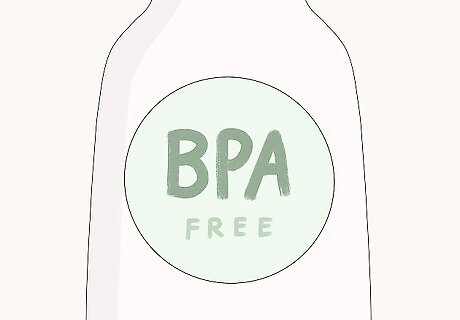
Make sure your plastics are BPA-free. Exposure to the chemical bisphenol A (BPA) may contribute to a hormonal imbalance. You might ingest BPA from plastic containers or metal cans. Choose plastic storage containers and water bottles that are labeled as BPA-free. Additionally, look for plastic food containers and cans that say “BPA-free” on the label. BPA can leech out of the plastic or metal and contaminate your food or water.
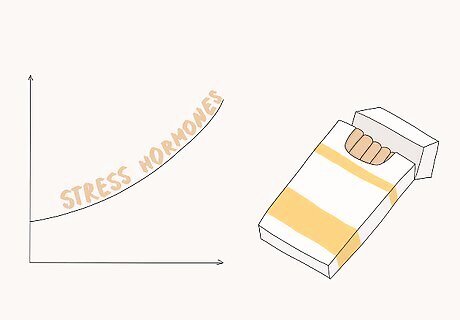
Stop smoking because it raises your stress hormones. The nicotine in cigarettes triggers your body to release stress hormones. This can lead to a hormone imbalance. Quitting smoking is really hard, so talk to your doctor about using quitting aids to help you stop. Your doctor might be able to offer you patches, gum, or prescription medication to help you quit.
When to Seek Medical Care
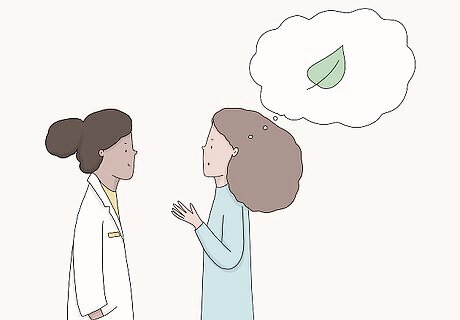
Check with your doctor before using natural treatments. While natural treatments are generally safe, they aren’t right for everyone. They may worsen certain conditions or interact with the medications you’re taking. Talk to your doctor before using natural treatments to make sure they’re right for you. Tell your doctor that you’re trying to balance your hormones. They’ll help you figure out which treatments will work best for your needs. Ask your doctor to run tests on your hormone levels to see if they’re at the correct levels. Common tests usually check thyroid function as well as levels of estrogen, progesterone, testosterone, and cortisol. If your doctor can’t run the tests, see if they can refer you to a naturopathic or functional medicine physician.
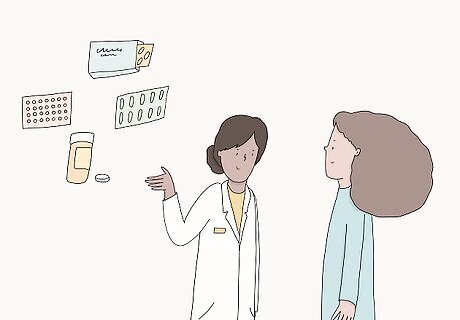
Talk to your doctor about other treatments if you don’t feel better. You might be able to balance your hormones naturally, but this isn’t always possible. If you don’t feel better, ask your doctor about other possible treatments. For instance, your doctor might offer you the following: Birth control pills to manage PCOS. Spironolactone or metformin to improve PCOS. Antidepressants to help balance the hormones that control your mood.
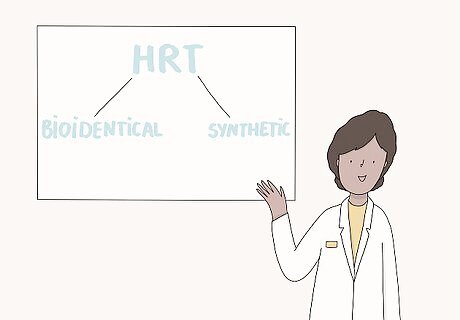
Ask your doctor if you might benefit from hormone replacement therapy. In some cases, you might be able to use hormone replacement therapy to balance your hormones. If your body isn’t producing enough hormones, your doctor might prescribe either bioidentical or synthetic hormones. Talk to your doctor to find out if hormone replacement therapy might be right for you. Bioidentical hormones are made from natural substances. Your doctor might prescribe estrogen, progesterone, DHEA, or progesterone. Synthetic hormones are artificial but can mimic the effects of real hormones.Tip: Hormone replacement therapy is most commonly used to treat menopause.

















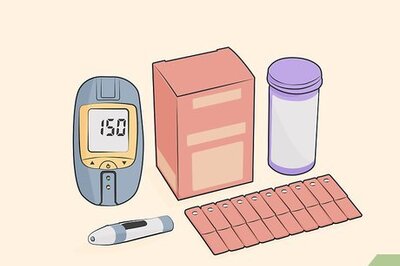


Comments
0 comment